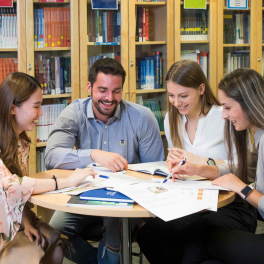What are the benefits of mentoring?
Arriving as an international student in a new school far away from home can be overwhelming, especially if you do not know anyone. It is important to receive support and advice from someone who has been through a similar situation as you. They can help you adjust and adapt to your new learning environment and the Australian way of life.
This is where mentoring can help.
In this blog, we will go through the benefits of mentoring for the mentee and the mentor, and our own students will share their experience of being in the Peer Mentoring program at KBS.
What is mentoring?
Mentoring is a relationship between two people who help each other develop personal strengths, set and achieve career goals, resolve challenges together and reach their full potential.

The benefits of being mentored (mentee)
Being mentored by someone delivers many benefits for your study and work life as well as your personal development.
The main benefits of being mentored are:
• Accessing knowledge and experience from someone who is further along in their studies or career than you.
• Finding out your strengths and new skills you need to develop.
• Personal development such as increasing your self-esteem and managing a work-life balance.
• Receiving feedback on your assessments and growing your confidence in your studies.
• Gaining support and encouragement during times of stress and anxiety.
• Receiving help with setting your career goals and being supported in achieving them.
• Expanding your network and career opportunities.
• Having someone to share your perspectives and ideas with and gaining advice on your industry of interest.
The benefits of mentoring (mentor)
Mentoring another student provides benefits for the mentor, especially in developing your communication, time management and leadership skills.
The main benefits of mentoring another student are:
• Opportunities to practise your communication and leadership skills as you share your knowledge and experience.
• Personal development (e.g. growing in confidence with teaching, better time management skills as you mentor people as well as study and work etc).
• Meeting other mentors and learning new ideas and skills from them.
• Being able to impact the lives of others positively and helping them achieve success.
Peer Mentoring program at KBS
The Peer Mentoring program at KBS is about students helping students. New students joining the program are paired with a mentor (who is a current student) and together they help each other develop their strengths and support each other in their studies and career goals.
Mariene, Vanessa, and Selvy are international students at KBS. The three of them have faced the challenges that many international students experience when coming to a new country to study.
They joined the KBS Peer Mentoring program where their mentors supported them in their new learning environment, study, work and social life. They wanted to do the same for future students and are now Peer Mentors themselves. They share their knowledge and experience with us.
MARIENE LESCANO
Master of Business Administration (Specialisation in Digital Management & Entrepreneurship), Filipino
Mariene shares her reasons why she decided to become a Peer Mentor.
VANESSA PASSI SILVA
MBA (specialisation in Digital Management), Brazilian
Why did you become a Peer Mentor?
I am an avid believer that mentoring programs are an incredible tool to foster personal and professional growth, particularly among students. As soon as I learned about the program, I thought it would be a valuable opportunity to share experiences and exchange knowledge with new KBS students, to offer them guidance based on my own experiences and challenges while studying abroad, as well as to connect with them and get to know them better.

What were the challenges and how did you overcome them?
I had mentees from over 3, sometimes 4 different continents, and arranging a suitable time for everyone was very difficult. I had to be flexible with my time.
What did you take away from the experience?
Being a mentor is a great way to connect with people while sharing and learning new experiences, perspectives and knowledge. I learned effective listening and empathetic understanding, our time and attention are the greatest gifts we can give one another. Taking the time to listen and appreciate others feels amazing. We are all connected by our humanity, our strengths and vulnerabilities, and even a simple smile can make someone's day brighter.
What are the most common questions new students ask you? How do you answer them?
The most common questions relate to career development, living in Australia, and how to succeed academically. I answer these questions by sharing real-life examples and my own experience, while also encouraging students to reflect on what is best for them considering their unique circumstances and talents.
SELVY GUSNI
Master of Business Analytics (Extension), Indonesian

Why did you join the Peer Mentoring program?
I joined because I wanted to be mentored. As a new international student starting my course during the COVID-19 pandemic, I was eager to make friends and gain insights into KBS' study environment from someone who had undergone a similar experience.
Being new to online classes, I had some concerns about how group assessments would be conducted. However, my mentors were a great source of guidance and shared their own experiences with me. They helped me adjust to online study and build my confidence in participating in class discussions.
What have you learnt by being a Peer Mentor?
I have had the privilege of mentoring 8 students. Each one of them has their own unique personality and background. Mentoring them has helped develop my problem solving, communication and leadership skills. My mentees also teach me new things too.
What are the most common questions new students ask you?
Majority of the new students are anxious about moving to a new country and have questions about how to navigate around the campus, finding resources, strategies on doing assessments, and how to get work experience.
How do you answer them?
As an international student myself, I went through similar experiences and faced the same fears as they did, so I give advice based on my personal experience to help them find out what works and what doesn’t.
Thinking of coming to Australia to study? Download our free Study in Australia e-book for everything you need to know about living and studying here. You can also learn more about the student support you receive at KBS.
You may also enjoy:








